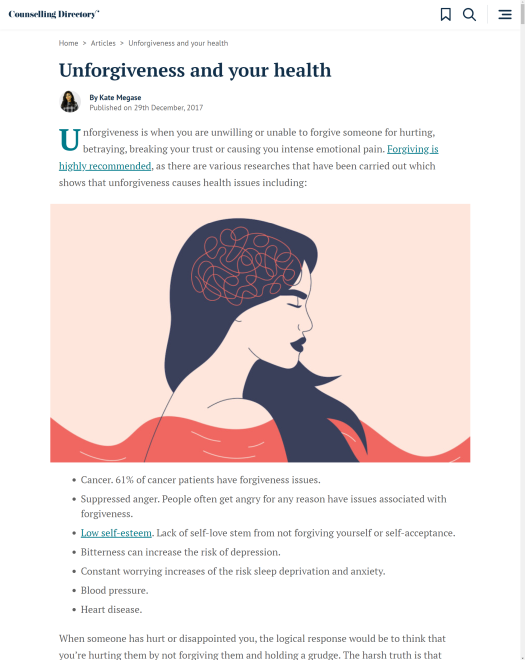Imagine a dagger of elegant craftsmanship. This dagger has been possessed by many; from beggars and thieves, to brothers and sisters, husbands and wives, parents and children, all the way up to the kings and queens of nations. This dagger has never been bought nor sold. It is always given as a gift and is often passed down, from generation to generation.
But it’s not who has possessed this dagger that makes this weapon unique.
You see, this dagger is cursed.
When its owner uses this dagger to wound another—and they almost always do—this dagger strikes two. As the owner lashes out at their loved one, their friend, their coworker, their pastor, their parent, they never miss their mark, but they themselves are always cut in return. In fact, the cut they receive is always twice as deep and twice as long as the one they give. Suffice it to say, it is often blind anger toward another that proves terminal to the one who wields this knife.
The name of this dagger? Unforgiveness.
The Two-Edged Blade of Unforgiveness
There are two ways unforgiveness cuts us: unforgiveness toward others and unforgiveness toward ourselves.
Forgiveness—both extending it and receiving it—is foundational to our human walk and yet, it can be one of the hardest things for us to do. When we’re done wrong by another person, our natural reflex is often to withdraw, to cut off, or to lash back. We nurse wounds, hold grudges, and remove favor.
Sometimes it’s us we can’t forgive; it’s ourselves. Maybe we condemn ourselves for things we did before we came to Christ. Maybe we still made bad decisions and followed our flesh after we called Jesus Lord. “I should have known better,” we say. “I was weak.” Then we struggle to reach for, and to be restored by, our heavenly Father because we have allowed sin and shame to spiritually gray us out and separate us from Love.
Neither unforgiveness toward others nor unforgiveness toward ourselves has any place in the Christian’s life. We are called to walk in forgiveness, releasing those who hurt us and receiving forgiveness for our own failures.
Defining Forgiveness
Let’s get clear on what forgiveness is. Forgiveness is the act of releasing someone of an obligation (a physical, spiritual or emotional debt.) That debt is often created by a suffered wrong. Forgiveness is comprised of three elements:
- HURT
- DEBT created by that hurt
- CANCELLATION of that debt
One of the elemental properties of forgiveness is that it must be given freely; it cannot be earned. You can earn trust but you must give forgiveness.
When we fail to forgive someone (even ourselves), we fail to cancel the debt. If we fail to cancel the debt, we remain bound by the debt. It is a loss that stays on the books of our lives.
The Parable of the Unforgiving Servant
The parable of the unforgiving servant (Matthew 18:21-35) shows us the importance of forgiveness and the danger of unforgiveness.
21 Then Peter came to him and said, “Lord, how often shall my brother sin against me and I forgive him? Seven times?”
22 Jesus said to him, “I say to you not seven times, but seventy times seven.”
23 “Therefore the kingdom of heaven may be compared to a king who wished to settle accounts with his servants. 24 When he began to settle, one was brought to him who owed him ten thousand talents. 25 And since he could not pay, his master ordered him to be sold, with his wife and children and all that he had, and payment to be made. 26 So the servant fell on his knees, imploring him, ‘Have patience with me, and I will pay you everything.’ 27 And out of pity for him, the master of that servant released him and forgave him the debt. 28 But when that same servant went out, he found one of his fellow servants who owed him a hundred denarii, and seizing him, he began to choke him, saying, ‘Pay what you owe.’ 29 So his fellow servant fell down and pleaded with him, ‘Have patience with me, and I will pay you.’ 30 He refused and went and put him in prison until he should pay the debt. 31 When his fellow servants saw what had taken place, they were greatly distressed, and they went and reported to their master all that had taken place. 32 Then his master summoned him and said to him, ‘You wicked servant! I forgave you all that debt because you pleaded with me. 33 And should not you have had mercy on your fellow servant, as I had mercy on you?’ 34 And in anger his master delivered him to the torturers until he should pay all his debt. 35 So also my heavenly Father will do to every one of you, if you do not forgive your brother from your heart.”
A few things to understand about this passage:
Seven times seventy
When Jesus says we should forgive seven times seventy times, He is alluding to the 70-week prophecy spoken through Daniel the prophet (Daniel 9:24-27). In this prophecy, the coming of the Messiah was predicted to occur within seventy “weeks” of years (seventy times seven,) or 490 years. This marks a period of grace over Israel by the Father. Jesus is saying, in essence, “You should extend the same grace the Father has shown you.”
Let’s do the math
A denarius was a day’s wage for a laborer, so we easily understand the debt of a hundred denarii being 100 days’ wages. A talent—valued as weight in silver and worth about twenty years’ wages for a laborer—totaled around 6,000 denarii. Today, in USD, one gram of silver costs about $0.72. At this price, a talent (about 33 kg, approximately 73 pounds) would be worth about $23,760. Multiplied by the 10,000 talents in this account, this means about $237,600,000 was owed! By these calculations, a laborer would need to work 164,384 years to repay this debt. Yet, the Master—knowing the servant had no way to repay Him—had compassion on him and forgave him his debt.
Who are the torturers?
In ancient times, the torturers (tormentors, jailers, executioners, depending upon your Bible version) would punish a prisoner physically, mentally, and emotionally to try and break them. This parable of the unforgiving servant shows us that anyone that does not forgive is exposed to torturers. Wounds that have not healed properly, that hurt every time we remember a past offense, torture us and keep us bound.
Who really loses?
Who is the real victim of unforgiveness? The one who withholds forgiveness. Unforgiveness breeds bitterness, stagnation and anger which—over time—leads to discontent, depression and disease. In Galatians 6:7-8, Paul warns of the devastation from being led by our flesh:
“Be not deceived; God is not mocked: for whatever a man sows, he will also reap. For he that sows to his flesh shall, by the flesh, reap corruption; but he who sows to the Spirit shall, by the Spirit, reap everlasting life.”
What are the Fruits of Unforgiveness?
Unforgiveness corrupts and stains
An unforgiving spirit does not limit itself to only one relationship; it is completely destructive. It stains us, it stains the worldview (the lens) we see through and then it stains every facet of our life.
Unforgiveness devours and binds
A victim of unforgiveness may wait for their persecutor to make the first step toward healing the injustice. However, while they wait (usually in vain), like a parasite, that unforgiving spirit continues to wreak havoc in their lives. By digging in, hardening their scars and refusing to forgive, a victim of unforgiveness places all their power into the hands of the very person who hurt them. They essentially shackle themselves to their persecutor!
Unforgiveness produces rejection and death
When rejection grows out of an unforgiving spirit, it leads to bitterness, causing tremendous damage in its wake. A person in unforgiveness may experience feelings of hardness or loss, as if something has been stolen from them. They feel robbed, violated, hurt, isolated, misunderstood. Yet, when they try to recover, they often find their other relationships turbulent and falling short. The Bible teaches us the fruit of sin is death. By clinging to the sin of unforgiveness, we can see the death of relationships, the death of peace, the death of joy—even physical death. According to Counseling Directory, unforgiveness has been linked with:
- 61% of cancer patients have forgiveness issues.
- Suppressed anger. Short fuses are often associated with unforgiveness.
- Low self-esteem. Lack of self-love often stems from not forgiving yourself.
- Leads to depression.
- Constant worrying. Often leads to sleep deprivation and anxiety.
- High blood pressure.
- Heart disease.

Further evidence of unforgiveness:
- We punish or hold hostage. We make others and ourselves spiritual prisoners.
- Persistent uncertainty. We fail to trust God has forgiven us.
- Guilt, shame and condemnation. The accuser loves it when we feel guilty because it grays out our faith.
- Compulsive behavior. Constant distraction from our hurt.
This is the end of part one of our talk on unforgiveness! In part two, we will look at the reasons we struggle to forgive, reinforce our understanding of God’s call on our life and then we’ll walk through the steps required to achieve forgiveness.
Remember, it’s the truth that sets you free.













